My Rollins Gateway: A Divine Alternative
December 11, 2019
By Adrienne Egolf
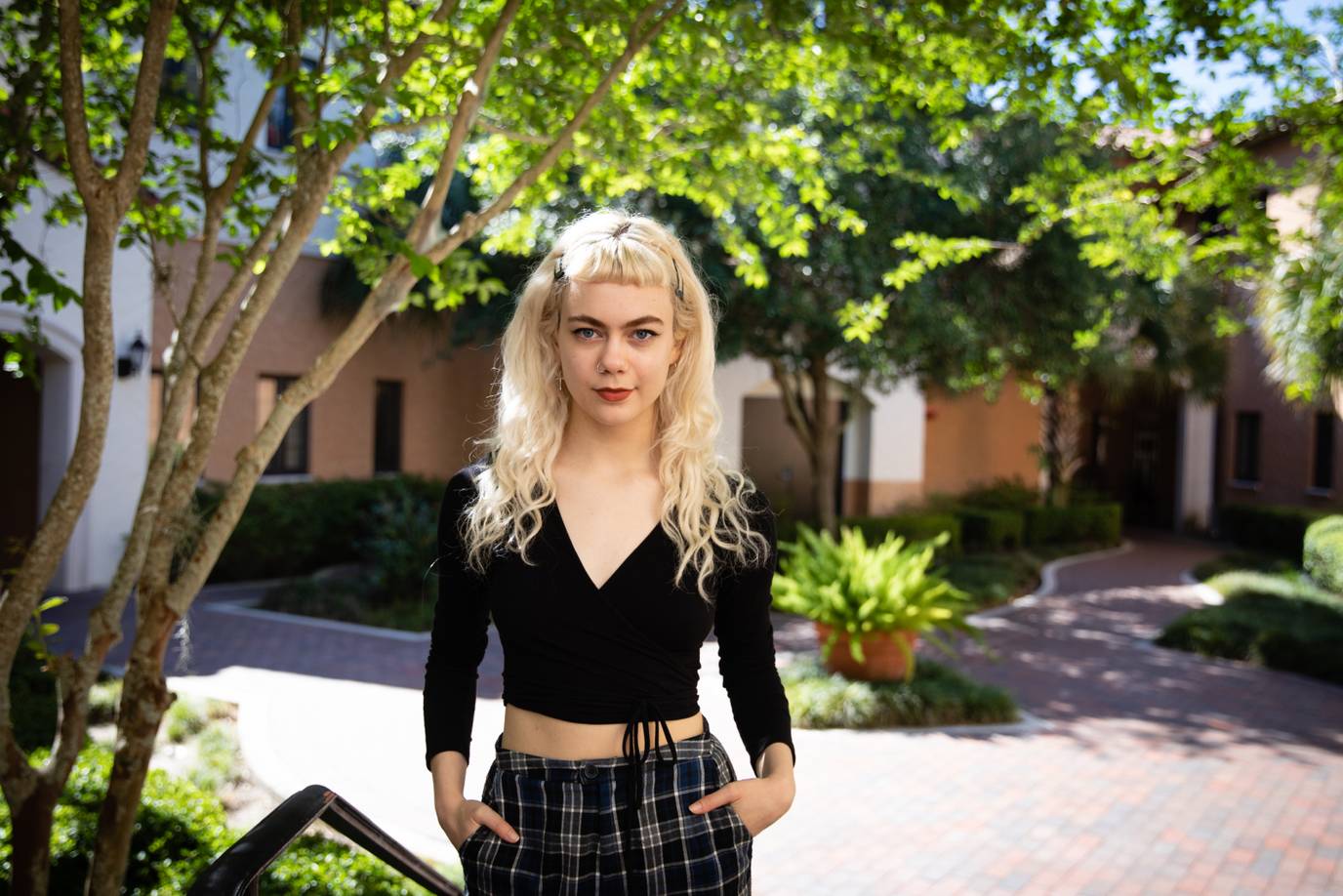
For Madeleine Scott ’19, Rollins’ unique approach to traditional disciplines sparked dual passions in economics and religion and landed her in a master’s program at Harvard.
A double major in religious studies and economics might not immediately suggest a down-to-earth student with a good sense of humor, but that’s exactly who Madeleine Scott ’19 is. A recipient of the Alfond Scholarship, Rollins’ premier academic scholarship, Scott can confidently rattle off a high-minded summary of the student-faculty research project she completed with religious studies professor Todd French—then interrupt herself with a self-deprecating laugh: “I sound like such a nut job.”
She’s well rounded in a way that’s obviously contributed to her success. As part of her work with French in Rollins’ Student-Faculty Collaborative Scholarship Program, Scott presented a paper at a conference where she was the only undergrad to present among a selection of master’s students from top universities. The pensive pragmatist also studied abroad in London, where she completed an independent study project as well as an internship with a local magazine in order to gain hands-on writing experience. Continuing in that vein, Scott also served as a contributor to the music section of Orlando Weekly, mostly covering Central Florida’s punk and hard-core rock scene.
The business-minded scholar started working toward a master of theological studies at Harvard Divinity School this past fall. While she expressed excitement at her next step, she’s also nostalgic about her time at Rollins—her favorite reading room in the library, her afternoons spent in professors’ offices. “The real egghead stuff,” she says. “That’s what I’ll appreciate most about my college experience.”
We recently caught up with Scott to find out more about how her penchant for eggheadedness and punk rock served her throughout college and how her time at Rollins prepared her for a master’s program at one of the country’s most prestigious universities.
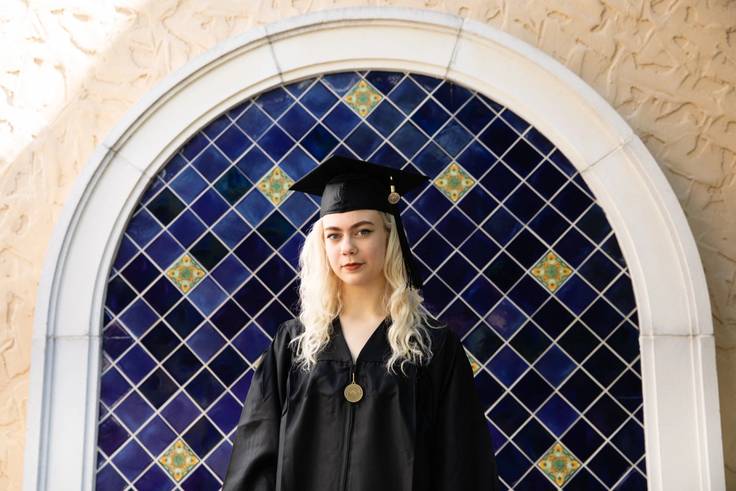
Now that you’ve been at Harvard for a few months, can you tell us a little bit about how you think your experience at Rollins prepared you to succeed at one of the country’s top universities? “I can’t stress enough how well both [religious studies professors] Todd French and Mario D’Amato prepared me to do this sort of work. Dr. D’Amato scheduled a book a week and asked us to write 500-word weekly exegetical papers, and this is exactly what’s expected of me in most of my classes. My second year, Dr. French told me to start using the research assistant Zotero, which is something I was surprised to learn many of my current classmates hadn’t been exposed to. I show up to class comfortable making points and asking questions, meeting and speaking candidly with professors, and acknowledging that I don’t know something.”
What made you choose to study religious studies and economics? “I definitely did not come into Rollins thinking I would pursue either major. I thought I wanted to do something completely different, like international relations or political science—something in that realm. And then my Rollins College Conference (RCC) course [a required seminar class designed for first-year students] was with Dr. French. I was very intrigued by him. He’s very good at proselytizing, and he’s very good at making students, especially those who take his RCC, interested in religious studies. So I thought, if I do religious studies, I can do a little bit of history, a little bit of philosophy, a little bit of sociology. But I also had a drive toward math and something quantitative and really fell in love with how the econ department at Rollins has such a strong focus on theory and goes beyond typical neoclassical economics.”
With that in mind, what would you say to someone who was considering studying religion or economics at Rollins versus somewhere else? “For someone who’s interested in theory and exploring questions that are a little bit different and out of left field, both departments can point you in a direction where you’re set up for further education in experimental research or things that are very theory-driven. I think both departments have a unique perspective that, from my understanding, you wouldn’t necessarily get at most schools. For example, you’re going to take an Intro to Christianity class or an Intro to Microeconomics class, but that’s not going to be the end point. That’s the jumping-off point for engaging in different ideas.”
How have your relationships with your professors impacted your time at Rollins? “In that initial class with Dr. French, I immediately connected to his perspective—the theories he was exposing us to and the ideas we were talking about in class. I was also very intrigued by the ways his perspective didn’t align with mine, so based on that experience, I continued taking classes with him. That developed into a mentorship relationship that I see as long-term. I wouldn’t have been able to do anything I’m doing now if I hadn’t had that initial first-semester interaction with him, and I’m really grateful for it.”
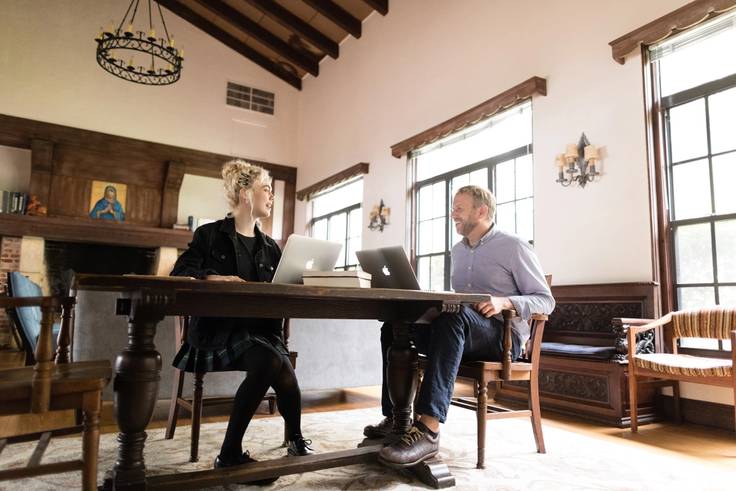
And you wound up doing student-faculty collaborative research with him. What was that like? “The biggest takeaway from that project was not anything that we read or that we wrote or did—those things were obviously important—but the biggest takeaway was that doing research in the humanities is not something that can be tied up with a bow in eight weeks. It was a real reality check. I realized that if I’m really interested in academic research, this is what it actually takes, and this is the degree to which I need be working and how I need to be working. It was supposed to be an eight-week research period, and we came to the end and weren’t even sort of done. We had way more questions than we did at the start, which was incredibly valuable. Practically speaking, it did an incredible job of preparing me to undertake a thesis my senior year. I don’t think I would’ve had the work ethic or writing skills to complete a yearlong project without some exposure to the process of actually constructing original research from the ground up.”
What were some of the questions you set out to answer? “The project started and ended, above all, with questions of authenticity as a means of accessing religious power. Both [Dr. French and I] are very interested in the ways contemporary religious organizations necessarily link themselves to the practices of late capitalism. One aspect of this that we explored was churches’ use of social media; specifically, we started to examine how Orlando megachurches presented themselves online. We spoke to social media coordinators from several area churches and asked them about Matthew 6:3 (“When you give to someone in need, don’t let your left hand know what your right hand is doing”). What does it mean to engage in charitable practices and then post them on social media? Similarly, what does it mean to be something that’s supposed to function primarily as a church community, but then have this huge, corporate facility? So we were really trying to get at the ways religious ideals have perhaps been repackaged and deployed to serve the ideals of late capitalism.”
Did you study abroad during your time at Rollins? If so, how did that enrich your college experience? “The Alfond Scholarship is the reason I was able to go to Rollins, and it is the reason I’ve been able to do three study-abroad programs. I had very limited international experience before coming to Rollins, so that’s a big thing for me, and a big thing that I feel grateful for. The semester abroad program I did in London was called CAPA. It was a program where you were taking classes, and I was able to do an independent research project and wrote a paper with very few restraints. The other component of the program was an internship, which was really valuable because at the time I was still thinking maybe I wanted to be a journalist. So I did an internship at this magazine called Nursing Times, which was a fascinating experience that I got a lot out of.”
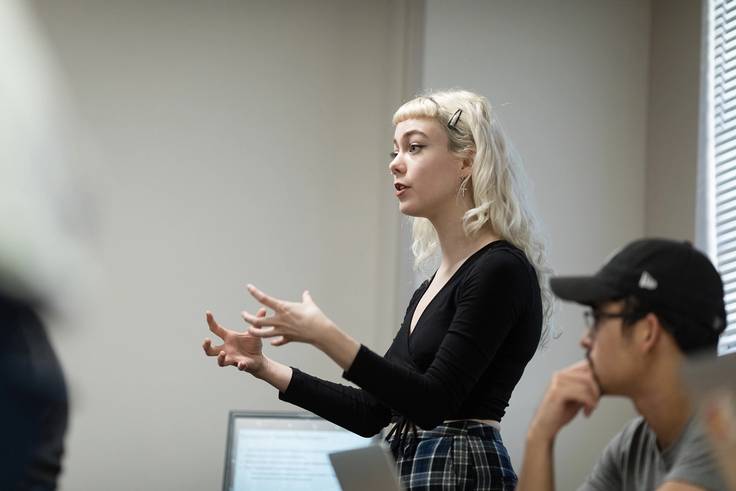
Where did you land on wanting to be a journalist or an academic? “It’s hard to be a journalist, and it’s hard especially if you want to do something niche within journalism, and in my case, it was music journalism. I had this realization that the stuff I was pursuing, I could largely do and make it more long-term and in-depth within the context of academics. A lot of the academic work I want to do is with music and music communities. I’m pretty enamored with the idea of some sort of future for myself where I’m an academic doing my PhD work or teaching while also writing for music publications. Having an academic perspective in something like music writing sounds like a way I could carve that path out for myself.”
So you started pursuing music journalism while you were at Rollins by writing for Orlando Weekly, right? Tell us about that experience. “My first year I was doing this zine, and it was centered on punk and hard-core music in Florida. I specifically had this idea of wanting to talk about women in hard-core music—nobody else was doing it. I had a radio show on WPRK [Rollins radio station] that tied into that. Around that same time Orlando Weekly got a new music editor, Matthew Moyer ’98, a Rollins alum, who really liked my show and asked if I would be interested in writing for the Weekly. I learned so much from him in the space of alternative news, and I got to be really creative. The way that I grew from that experience is inextricably linked to what I’m pursuing in research and academic work.”
What are you going to miss most about Rollins? “The thing I took away the most was the personal relationships with mentors, with faculty members. It really was the small class sizes and actually having seminars rather than lectures. Those things made a world of difference, and they taught me how to be a good student and how to care about what I’m learning rather than just go through the motions. I hope the next phase of my life will involve this sort of education. The courses taught by Dr. French and Dr. D’Amato were just as good as you’d get at an Ivy League, and I’m so grateful for it. I hope the education I receive in the future will be as good as Rollins.”
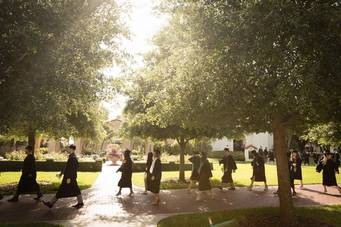
Rollins Results
From our innovative curriculum to our commitment to career services, find out how Rollins prepares our graduates to lead meaningful lives and forge productive careers.
Read More
July 15, 2024
Rollins College Computer Science Professor Discusses AI and the Future of Work
Daniel Myers, an associate professor of computer science at Rollins College, provides expertise on how AI is changing the nature of work.
July 08, 2024
Gunter’s Book on Climate Change Receives Multiple Awards
Political science professor Mike Gunter’s book Climate Travels recently won awards from Foreword magazine and the American Library Association.
July 03, 2024
Rollins Welcomes Dean Lauren Smith
The 32789.com interviewed Lauren Smith, the new Dean for the Hamilton Holt School about her experience with adult education.
